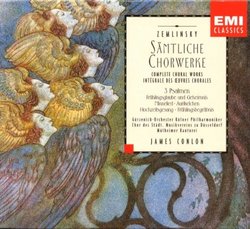| All Artists: Zemlinsky, Voigt, Albert, Conlon Title: Zemlinsky: Samtliche Chorwerke (Complete Choral Works) Members Wishing: 0 Total Copies: 0 Label: EMI Classics Imports Release Date: 2/9/1999 Album Type: Original recording reissued Genre: Classical Styles: Opera & Classical Vocal, Historical Periods, Modern, 20th, & 21st Century Number of Discs: 1 SwapaCD Credits: 1 UPCs: 724355678324, 7243556783246 |
Search - Zemlinsky, Voigt, Albert :: Zemlinsky: Samtliche Chorwerke (Complete Choral Works)
 | Zemlinsky, Voigt, Albert Zemlinsky: Samtliche Chorwerke (Complete Choral Works) Genre: Classical
|
Larger Image |
CD Details |
CD ReviewsZemlinsky Lifts His Voice Thomas F. Bertonneau | Oswego, NY United States | 01/05/2001 (5 out of 5 stars) "Alexander von Zemlinsky (1871-1942 - he dropped the "von" after Austria became a republic in 1919) composed in all genres from string quartet to opera. James Conlon, an American active in Europe, has taken up Zemlinsky's cause in the manner of a true champion and, with the cooperation of EMI, has issued an ambitious tournée of the not-quite-forgotten composer's music. At the heart of Zemlinsky's choral-orchestral oeuvre are the three Psalms included in the program of the present disc. Zemlinsky's religious background shows many strains: Of Catholic, Jewish, and Muslim extraction, he converted to Protestantism early in the century. The Psalms (Nos. 13 [1935], 23 [1910],and 83 [1901]) belong to both the Christian and the Jewish traditions and so link those two aspects of Zemlinsky's familial milieu; they represent the early, middle, and late periods of his activity. Listeners will note how, in the sequence (83, 23, 13), Zemlinsky's "voice" becomes more distinct. Psalm 83 still works within the Brahmsian ethos and compares with works like "Das Schicksal Lied" or the individual movements of "Ein Deutsches Requiem." "Do not keep silence in this manner, and do not be still, O God, do not hold your peace," the chorus laments to a lugubrious, minor-key melody in slow march-rhythm. An instrumental fugue of grand architecture suggests the wrath of God that the Israelites wish upon their enemies. Psalm 23, "The Lord is my shepherd," requires less agitation in the setting. To highlight the pastoral imagery of the verses, Zemlinsky uses Rimsky-Korsakovian "magical instrumentation" - harp, celesta, glockenspiel, and percussion. The opening oboe-solo looks back to the "Scène aux champs" of the "Symphonie fantastique." The accesion to power of the Nazis forced Zemlinsky from Germany in 1933. Psalm 13, "How long will you forget me," gives expression to the composer's sense of insecurity in Vienna, from which he would have to flee in 1938. Like Psalm 83, this one is intensely polyphonic, with two extended fugues; a sustained chromaticism inveigles the music, giving it a deliberately strained quality. The orchestral colors show more harshly than before. The cantata "Frühlingbegräbnis" sets Paul Heyse's symbolist allegory about "The Death of Spring." Not as impressive as the three Psalms, it nevertheless affords twenty-four minutes of listenable, late-Romantic fare. Oddly, the same performance appears on another of Conlon's Zemlinsky CDs for EMI, along with the "Cymbeline" Suite and "Tanzpoem." Like Mahler, Zemlinsky proclaimed that his time would come. He joins in the wider resurrection of late-Romanticism and forms ranks with Schreker, Korngold, Pfitzner, and Schmidt in enjoying new-found and well-deserved notice on disc. Those interested in this CD should also explore the just-released companion-disc of Zemlinsky's song with orchestra."
|

 Track Listings (15) - Disc #1
Track Listings (15) - Disc #1